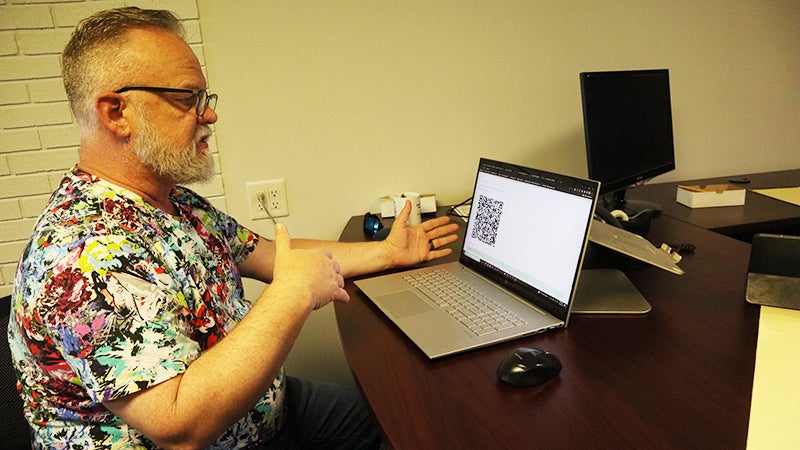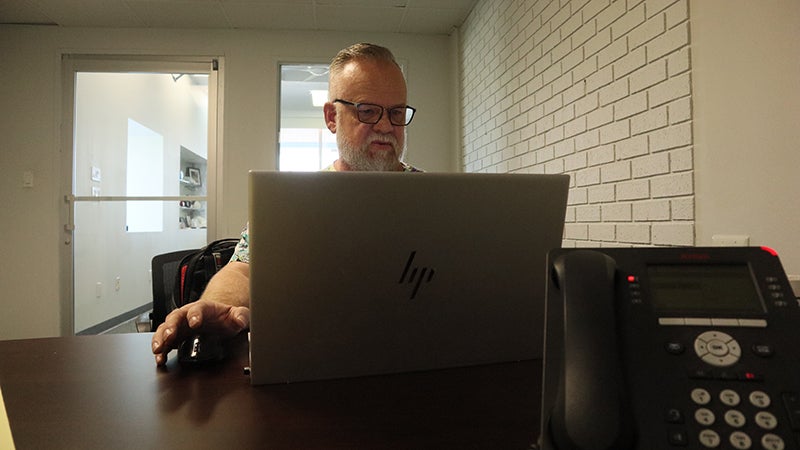Port Neches man creates program to deter fake paper license plates, cut down on crime
Published 12:36 am Saturday, April 30, 2022

- Quentin Reynolds demonstrates how his application works. (Chris Moore/The News)
|
Getting your Trinity Audio player ready...
|
Quentin Reynolds worked as an emergency responder for years and realized a common problem.
Too often, he arrived at a scene to find a vehicle with a fake paper license plate. The fake documentation became a bit of a pet peeve of his, spotting them regularly while driving or riding in the car.
“Dealing with the public, I have seen and heard stories of the impacts of uninsured drivers, who have these plates. You have someone who is law-abiding and doing everything they can to get by and then you have someone who is for whatever reason, not, and they have no recourse. For the longest time, I wanted to know how this could be fixed.”
Reynolds had been learning to make code for computers on the side for several years. During a gap year, he took an online course in order to get more fluent and familiar with the process. After getting relatively comfortable, he realized he could potentially help solve one of the biggest issues facing the state and his personal pet peeve.
He created an application called Vin Guard that could create and read a QR code, which would hold information on vehicles and drivers. The application would only be accessible to the state and licensed auto motor dealers.
“It is blockchain-based,” he said. “It creates NFTs but it is not like anything being used currently… This application would take anything that you can publicly get off a vehicle by looking at it and going on to car facts. It encrypts all of that. Because of the way it is done, it runs on a private blockchain.”
The QR code will be an NFT (Non-fungible token), which makes it more difficult to duplicate.
“The code can be printed on the license plate or returned as a decal, like an inspection sticker,” Reynolds said. “The flip side to this is that no bad actor can access it. Someone could create a QR code if they wanted. Because this is readable by standard technology right now, it gives law enforcement an immediate status verification of that license plate.”
If the code is false, it would show an error on the application.
The application is more than just a one-trick pony. Reynolds said the database could also hold information that could also aid law enforcement with auto thefts.
“By eliminating counterfeit plates, it takes unsafe vehicles off the road,” he said. “The system could hold vehicles that have been in floods and deemed unsafe or unsalvageable. It prevents anything from being issued for that vehicle ever again. Once it goes into the system, you can forget about it.”
Fake paper plates have been a large issue for the state for the past few years.
“It is really bad,” he said. “This week, there was a report out of Houston that Harris County had lost $80 million over the last six years. I have extrapolated this out to Jefferson County. We are approaching $120,000…After doing the research, Texas lost up to $300 million for fiscal year 2021 for unregistered vehicles. That is not counting anything else. (Crime that comes with unregistered vehicles) is a huge problem… A lot of crime is tied to fake paper plates. In 2021 there were three individuals that the justice department managed to get indictments against. They had generated over 600,000 paper plates between three people.”
For those who have access to program to generate the codes, they will have to go through multiple steps to insure it’s security.
“In order to access mine, you have to have a dealers license,” he said. “It requires a fingerprint, which can be picked up with a USB or a computer or phone. It requires a picture of the person associated with that account. Once they are granted access, it creates a profile just like with anything else. That information is embedded into the code. If law enforcement pulls it up, they can see my name, address, status of my vehicle and insurance. It is extremely efficient.”
Reynolds has reached out to several government officials and has received some interests from some of the top representatives in the state.






